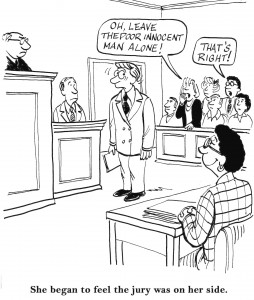Keys to Communicating During Jury Selection

Whether you are a defendant or a plaintiff in a criminal or civil case, having access to a “jury of our peers” is a cornerstone of our justice system. How those jurors are selected also plays a vital role in winning your case.
How a Jury is Selected
Many of us have been selected for jury duty, and at least know the very beginning of the process. Six to 12 jurors are selected from a pool of candidates chosen randomly by the state. In civil matters, many jurisdictions are using six jurors as the standard, though that can be adjusted higher based upon input from all parties.
The prosecution, defense and judge all have an opportunity to question each person to determine if they are an ideal candidate, looking for anything in their life experiences that might prejudice their judgement.
There are two ways attorneys on both sides can object to a jury candidate:
Peremptory challenges – An attorney does not have to give a reason for objecting to a juror, unless the opposing attorney argues that the decision was discriminatory based on race, ethnicity, or gender.
Challenges for cause – An attorney gives a specific reason why the prospective juror would not be unbiased or fair in their decisionmaking.
Since jurors can make vital decisions and judgements on a subconscious level, the juror choosing process can make or break your case. Here are some of the considerations:
Set the Right Tone
Not everyone is comfortable in a courtroom environment. Rather than coming across as an interrogator, it’s important for an attorney to be cordial and diffuse any tension that may exist. Making prospective jurors comfortable and relaxed will make it more likely that they will communicate the vital information needed to determine their viability.
Use Clear and Concise Communications
For the layperson, much of the verbiage surrounding the law is confusing, since much of it isn’t used in the daily lives of non-lawyers. That concern aside, even when speaking in plain language, it’s best to get to the point in as few words as possible.
Use Negative Responses to Your Advantage
Inevitably, some prospective jurors will “sound the alarms” that they will be a poor candidate for your case, by what they say in response to an attorney’s questions. While this may mean an attorney will seek to have that juror dismissed, it also provides the opportunity to uncover the same concerning views in other jurors. The best approach is to respond respectfully, then turn the question on other jurors to see if they share similar views.
Search for Biases (The Right Way)
The easiest way for an attorney to not get to the heart of a juror’s belief system is to focus on questions with clear cut “A or B” answers to them. The goal is to get a juror talking, divulging information without having to directly address it. So, a good attorney should make jurors feel comfortable (as mentioned earlier), then use open-ended questions where they will feel have the opportunity to elaborate.
During the jury selection process, it’s not always what an attorney asks, but how they ask it. It’s certainly important to ask the right questions, but often the best way to get the answers is to find indirect ways to inspire jurors to openly and honestly communicate.
Contact me here if you have anymore questions.


